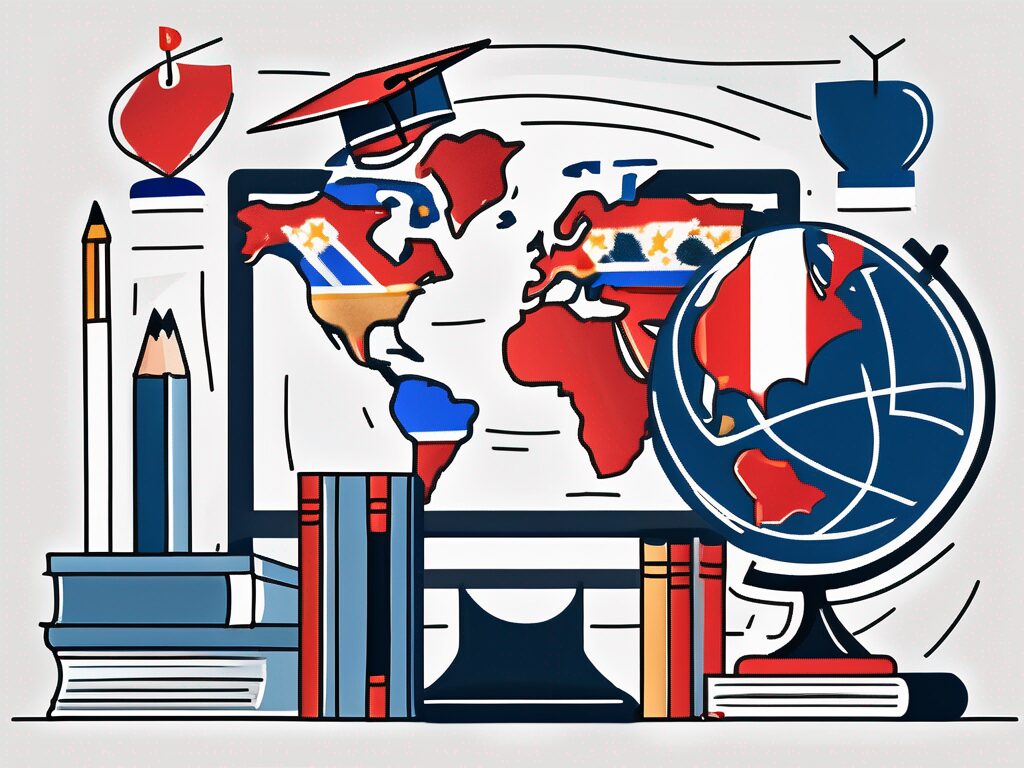Teaching is a noble profession that can shape the minds of future generations, and what better way to make a global impact than by venturing into the world of international teaching? Embracing global opportunities and stepping into an international teaching environment can be a life-changing experience that opens doors to new cultures, perspectives, and personal growth. In this article, we will explore the allure of international teaching, the role of cultural exchange, the essential qualifications needed, tips for thriving in an international teaching environment, and the future of this exciting field.
Understanding the allure of international teaching
There is something undeniably captivating about teaching in a foreign land. The idea of immersing oneself in a different culture and contributing to the education of students from diverse backgrounds is exciting and fulfilling. Not only does international teaching allow you to explore new horizons, but it also offers unique benefits that can enrich your professional and personal life.
The unique benefits of teaching abroad
One of the most enticing aspects of international teaching is the opportunity for personal growth and development. By living and working in a foreign country, you will be exposed to new ways of thinking, teaching techniques, and educational systems. This exposure can enhance your adaptability, problem-solving skills, and cross-cultural understanding.
Moreover, teaching abroad provides you with the chance to expand your professional network. Collaborating with educators from different parts of the world can spark collaborations, research opportunities, and even lifelong friendships. It’s a chance to connect with like-minded individuals who share your passion for education and the desire to make a global impact.
Overcoming the challenges of international education
While international teaching offers many rewards, it is not without its challenges. Language barriers, cultural differences, and adjusting to a new environment can be initially overwhelming. However, with an open mind and a willingness to learn and adapt, these hurdles can be overcome.
Research shows that training in intercultural competence is crucial for success in an international teaching environment. Being able to navigate cultural nuances, communicate effectively, and embrace diversity will help you thrive in your new role. Investing in cultural awareness programs and language courses can significantly aid your transition into the global teaching community.
Furthermore, teaching abroad allows you to explore the rich history and traditions of your host country. From visiting ancient landmarks to experiencing local festivals, you will have the opportunity to immerse yourself in a vibrant and diverse culture. Whether it’s savoring the exotic flavors of street food or learning traditional dances, every day will be a chance to broaden your horizons and create lasting memories.
Additionally, teaching internationally opens doors to unique travel experiences. With weekends and holidays at your disposal, you can embark on exciting adventures to nearby countries and explore their wonders. Imagine strolling through the bustling streets of Tokyo, gazing at the breathtaking landscapes of New Zealand, or marveling at the ancient ruins of Rome. The world becomes your classroom, and every destination becomes a lesson in itself.
In conclusion, international teaching offers a plethora of benefits that go beyond the classroom. It allows you to grow both personally and professionally, connect with educators from around the world, and overcome challenges through cultural understanding. Moreover, it provides opportunities to immerse yourself in a new culture, explore historical landmarks, and embark on thrilling travel adventures. So, if you’re seeking a rewarding and transformative teaching experience, consider venturing into the world of international education.
The role of cultural exchange in global teaching
One of the most remarkable aspects of teaching in an international environment is the opportunity for cultural exchange. By immersing yourself in a different culture, you can gain valuable insights that will transform your teaching style.
When engaging in cultural exchange, educators have the chance to learn about various teaching methods and approaches that may be different from their own. For example, in some cultures, a more collaborative approach to learning is favoured, while in others, a more traditional, teacher-centred method is prevalent. By understanding and incorporating these diverse practices, teachers can adapt their techniques to suit the needs and preferences of their students, ultimately enhancing the overall learning experience.
Enhancing your teaching style through cultural immersion
Cultural immersion allows you to observe and adopt teaching practices from around the world. This exposure to different educational philosophies and methodologies can enrich your teaching style, making you a more versatile and effective educator. By incorporating a diverse range of approaches into your teaching repertoire, you can cater to the unique needs of your students and create a dynamic learning environment.
Moreover, cultural immersion can also lead to the development of cross-cultural communication skills. As teachers interact with students from various backgrounds, they learn to navigate linguistic and cultural differences effectively. This not only improves classroom dynamics but also equips educators with valuable intercultural competencies that are increasingly important in today’s globalised world.
The impact of diverse classrooms on personal growth
Teaching in a diverse classroom setting has a profound impact on personal growth. Interacting with students from various cultural backgrounds not only broadens your horizons but also challenges your assumptions and biases. It fosters empathy, understanding, and the ability to appreciate different perspectives. These qualities are invaluable not only in the classroom but also in all facets of life.
Furthermore, exposure to diverse perspectives can spark creativity and innovation in teaching practices. By embracing the richness of cultural diversity within the classroom, educators can develop innovative ways to engage students and promote inclusive learning environments. This creativity not only benefits the students but also enhances the professional development of teachers, encouraging continuous growth and adaptation in their pedagogical approaches.
Preparing for an international teaching career
Now that you appreciate the allure and benefits of international teaching, you may be wondering how to embark on this exciting journey. Proper preparation is key to ensuring a successful transition.
Essential qualifications for teaching abroad
In addition to a passion for education, there are certain qualifications that are highly valued by international schools. Most institutions require a recognized teaching qualification, such as a Bachelor’s or Master’s degree in Education, along with relevant teaching experience. Additionally, acquiring a TEFL (Teaching English as a Foreign Language) certification is often advantageous, as it demonstrates your ability to teach English in non-native speaking countries.
Moreover, intercultural competence and adaptability are crucial in an international teaching career. Demonstrating an understanding of cultural diversity and an ability to work in challenging environments will help you stand out from the competition.
Navigating the international job market for teachers
When searching for international teaching opportunities, it is important to tap into reliable resources and networks. Many recruitment agencies specialize in placing teachers in international schools. These agencies can provide guidance and support throughout the application process, ensuring a smooth transition into your new role.
Furthermore, attending international education conferences and job fairs can be an excellent way to meet recruiters and establish connections. These events often provide valuable insights into global teaching trends and offer opportunities to learn from experienced educators.
Additionally, it is worth considering the specific requirements and expectations of the country you wish to teach in. Each country has its own unique educational system and cultural norms that may influence the teaching methods and curriculum. Researching and familiarizing yourself with these aspects will not only enhance your understanding of the local context but also demonstrate your commitment to providing a quality education.
Furthermore, gaining international experience through volunteering or teaching in diverse communities within your own country can greatly enhance your resume. This experience showcases your ability to work with students from different backgrounds and adapt your teaching style to meet their needs. It also demonstrates your willingness to go above and beyond in your pursuit of a successful international teaching career.
Thriving in an international teaching environment
Once you have secured an international teaching position, it’s time to embark on a new adventure. Thriving in an international teaching environment requires flexibility and adaptability, as you will encounter different educational systems and cultural norms.


Embracing the challenges of teaching in a foreign land can be a rewarding experience, offering a unique opportunity for personal and professional growth. By immersing yourself in a new culture and education system, you can broaden your horizons and gain valuable insights that will enrich your teaching practice.
Adapting to different education systems
Each country has its own unique approach to education, and being open to embracing new systems and methodologies is essential. Take the time to familiarize yourself with the local curriculum and teaching practices. Seek guidance from experienced colleagues and be proactive in seeking professional development opportunities to enhance your understanding of the local educational landscape.
Exploring the nuances of different education systems can be enlightening, allowing you to appreciate the diversity of approaches to teaching and learning around the world. By embracing these differences, you can become a more versatile and effective educator, capable of meeting the needs of a diverse student body.
Building a supportive network abroad
Moving to a new country can be daunting, but you are not alone. Building a supportive network of colleagues, fellow expatriates, and local friends can ease the transition and provide a sense of community. Engage in social activities, join professional organizations, and make an effort to connect with like-minded individuals who share your passion for education.
Creating a strong support system in your new environment is crucial for your well-being and professional development. By fostering meaningful relationships with colleagues and friends, you can navigate the challenges of living and working abroad with confidence and resilience. Together, you can share experiences, exchange ideas, and support each other on your international teaching journey.
The future of international teaching
As the world becomes increasingly interconnected, the demand for international teachers continues to grow. In an era of globalization, the ability to navigate and appreciate cultural diversity is highly valued.
The growing demand for international teachers
According to data from the International School Consultancy, the demand for international schools worldwide has been steadily increasing over the past decade. This growth is driven by various factors, including expatriate populations, international relocations, and the desire for globally-focused education.
As more families choose international schools for their children’s education, the need for qualified international teachers will continue to rise. This presents exciting opportunities for educators who are passionate about making a difference on a global scale.
How global teaching shapes the future of education
Global teaching has the potential to shape the future of education by fostering intercultural understanding, empathy, and global citizenship. By exposing students to diverse perspectives and teaching methodologies, international educators play a crucial role in nurturing well-rounded individuals who are prepared to thrive in an interconnected world.
Furthermore, the global exchange of teaching practices and ideas promotes innovation in education. By sharing best practices, educators can learn from one another and collectively elevate the quality of education worldwide.
Conclusion
Embracing global opportunities and venturing into an international teaching environment can be a transformative experience. The allure of teaching abroad lies in the unique benefits it offers – personal growth, cultural exchange, and the chance to make a global impact. By acquiring the essential qualifications, navigating the international job market, and thriving in your new role, you can embark on a fulfilling career that shapes the future of education. So why wait? Take the leap and embrace the rewards of an international teaching career.

